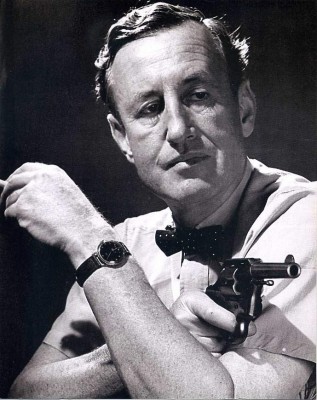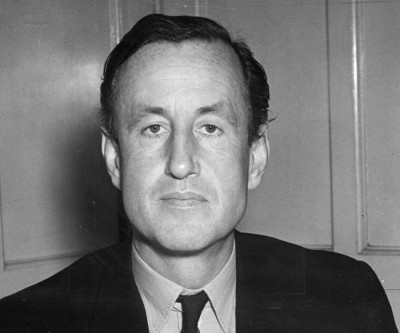 James Bond – secret agent, trained marksman, civil servant and… part-time author? 007 creator Ian Fleming gave some intriguing clues about Bond’s life in between assignments, and how his hero occupied his time at his desk in the rather grey building that served as Secret Service HQ, while waiting hopefully for the next call from M’s secretary and a briefing from his boss. One project involved Bond putting various physical fighting skills into written form for other members of the Service.
James Bond – secret agent, trained marksman, civil servant and… part-time author? 007 creator Ian Fleming gave some intriguing clues about Bond’s life in between assignments, and how his hero occupied his time at his desk in the rather grey building that served as Secret Service HQ, while waiting hopefully for the next call from M’s secretary and a briefing from his boss. One project involved Bond putting various physical fighting skills into written form for other members of the Service.
Back in 2013, the December 14th edition of the UK’s arts and politics magazine The Spectator contained an entertaining article by Matthew Woodcock on the literary aspects of Fleming’s famous fictional creation. Woodcock opened his article by noting: ‘There is one last James Bond book from the late 1950s that remains unpublished’. He revealed, however, that it was not a book by Ian Fleming but one written by Bond himself!
As Woodcock pointed out, in Fleming’s novel Goldfinger from 1959, the reader learns that 007 spends his hours on night duty at the anonymous Secret Service HQ near Regents Park in London compiling a manual on unarmed combat called Stay Alive!, containing the best that had been written on the topic by his peers in secret intelligence agencies around the globe.
In Woodcock’s estimation, it should come as no surprise that Fleming’s hero has writerly pretensions. The Bond creator often injected some of his own characteristics and interests into James Bond. In fact, as a number of his biographers have recognised, Fleming had read widely in French and German literature when in his twenties, and subscribed to all the avant garde literary magazines of the day. Moreover, Fleming was an avid collector of First Editions, and also purchased and re-launched the erudite magazine the Book Collector.
The James Bond author inevitably gave his famous creation 007 some interesting bookish impulses: James Bond has a book-lined sitting-room in Moonraker, the books clearly used in his preparatory research for future missions. Bond also evidently liked to read a good thriller, such as the work of Eric Ambler (cited in From Russia With Love) and Raymond Chandler (cited in Goldfinger). As Woodcock noted, the literary references in Fleming’s Bond books are comparable to the furnishing of technical details about cars, dining, drinks, etc that Fleming used to ground his fantastic plots in a recognisable reality – something Kingsley Amis had identified as ‘the Fleming effect’. Woodcock concluded his article by speculating that, if Fleming had lived to tell the tale of 007’s retirement, James Bond may even have completed Stay Alive!
Interestingly, the director of the last two Bond movies, Sam Mendes, was evidently keen to remind audiences about the ‘literary’ side to Bond and his world. In 2015, the Sunday Times revealed that a second-hand and antiquarian book dealer from the leafy suburb of Chiswick in south-west London had been given the job of stacking 007’s shelves in his flat (seen briefly in Spectre). The same dealer had previously chosen the books for M’s apartment, glimpsed briefly in Skyfall.
Did You Know?
Ian Fleming, with his journalist’s eye for the unusual and adventurous, was always on the look-out for a new writing project, especially if it offered him opportunities to travel to exotic places. Shortly after he completed his James Bond novel Dr. No, Fleming revealed to his publishers Jonathan Cape that he was contemplating writing a new non-fiction book, which had the tentative working title Round the World in Eight Adventures. His employer, the Sunday Times newspaper, had suggested to him that he could have two to three months abroad to write a series of reports based on real-life escapades, and the Bond author had already planned out some of the potential topics: these included reporting on a treasure hunt that was going on in the Seychelles, writing an account of the Great Cave of Niah in North Borneo in Africa, and conducting an investigation of gold smuggling in Macao. Fleming said that he wanted to show that the world was ‘still a very exciting place in spite of aeroplanes and sputniks’ and that ‘just because some types of adventure are old fashioned doesn’t make them less exciting’.

